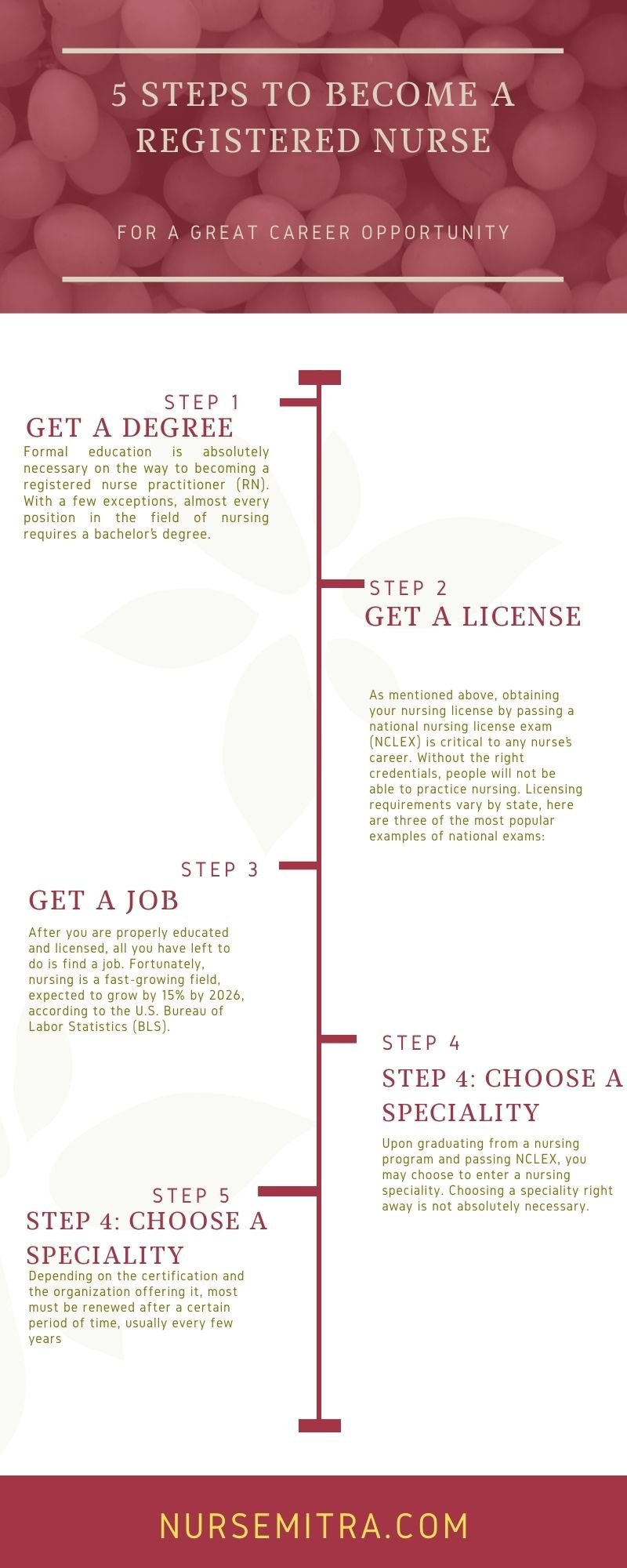How to become a registered nurse step by step guide:-
Registered Nurses (RN) provide and coordinate patient care, educate patients and the public about various health conditions, and provide advice and emotional support to patients and their family members. Registered nurses assist physicians in hospitals and in a variety of medical settings. They perform multiple tasks related to patient care, case management, and treatment planning.
Definition of the registered nurse
The definition of the registered nurse is a qualified nurse graduate who has been authorized by a state authority after qualifying for registration.
| Registered Nurse Course | 2 years Associate Degree (AD) or 4 years Bachelor of Science (BSN) |
| Expected employment growth | 15% increase |
| Job description of the registered nurse | Hospitals, residential care centres, etc |
| Relevant Certifications | State Nursing License |
| Registered nurse salary | $60,500 – $76,000 |
How to Become a Registered Nurse
Nursing is a rapidly growing field with significant professional demand for qualified individuals. This step-by-step guide will provide useful information on how to become a nurse, the educational and technical qualifications involved, and the position itself.

Steps to Becoming a Registered Nurse
Step 1: Get a degree
Formal education is absolutely necessary on the way to becoming a registered nurse practitioner (RN). With a few exceptions, almost every position in the field of nursing requires a bachelor’s degree.
Associate degree in nursing (ADN)
This degree program is designed to develop individuals in solid fundamental knowledge, attitudes and skills for nursing practice. With only two or three years of courses required, the associate’s degree requires the least amount of time and money invested in all degree options. After the coursework is completed, individuals must pass the National Licensing Exam (NCLEX).
Bachelor of Science in Nursing (BSN)
The Bachelor of Science in Nursing, or BSN, is another path an individual must take to become a nurse. You do not need an associate’s degree to enrol in a Bachelor of Science program. this degree program requires three to four years of coursework to be completed, and these prospective nurses are still required to pass the National Licensure Examination (NCLEX) before beginning practising.
BSN programs consist of general education liberal arts courses, specific nursing courses, and clinical education. BSN programs provide a wide variety of clinical experiences for students, often helping the student decide which nursing speciality they may want to pursue after graduation.
Step 2: Get a License (NCLEX)
As mentioned above, obtaining your nursing license by passing a national nursing license exam (NCLEX) is critical to any nurse’s career. Without the right credentials, people will not be able to practice nursing. Licensing requirements vary by state, here are three of the most popular examples of national exams:
Certified Nursing Assistant (CNA): This state competency exam is designed for individuals who want to work as nursing assistants. THE ANC has a rather limited scope of responsibilities, and the review will reflect that.
National Council Licensing Exam (NCLEX-PN): Licensed practical nurses (LPN) are required to pass this test. LPNs have a slightly wider range of responsibilities than their CNA counterparts. They are tasked with administering certain medications or performing certain medical tests. The review would cover these additional responsibilities and the understanding of more basic assistance.
National Council Licensing Exam (NCLEX-RN): Registered Nurses (RN) are required to pass this test to practice. Of the three that appear in this outline, this examination would be the most in-depth.
Step 3: Get a job
After you are properly educated and licensed, all you have left to do is find a job. Fortunately, nursing is a fast-growing field, expected to grow by 15% by 2026, according to the U.S. Bureau of Labor Statistics (BLS). That’s more than double the average national growth rate for all jobs. It is important to note that nursing has also become a more popular profession, so there will be healthy competition for openness
Step 4: Choose a speciality
Upon graduating from a nursing program and passing NCLEX, you may choose to enter a nursing speciality. Choosing a speciality right away is not absolutely necessary. Some nursing positions associated with different specialities may require specific certifications or more advanced degrees. Here are some of the most popular nursing specialities:
Neonatal Nursing: These nurses work with patients directly before and after giving birth. Usually, these nurses work in the neonatal unit in a hospital, but may also work in related units that do similar work.
Nurse-midwives: These nurses guide patients through the entire process of pregnancy and childbirth. Currently, individuals in this branch of nursing are highly demanded and well-compensated.
Clinical Nursing: This term covers nurses with advanced degrees and advanced certifications who oversee the work of other nurses.
Critical Care Nursing: Nurses who specialize in critical care are usually employed by hospitals and work in critical care units or trauma centres.
Step 5. Obtain Board certification
RNs who want greater recognition in their careers become board certified. In order to qualify, RNs usually need about two or more years of clinical experience in a speciality focus and must pass an exam Credentials Aside from passing the NCLEX-RN exam, there are many other credentials or certifications available to registered nurses. The American Nurses Credentialing Center offers many certification programs, some of which are listed below.
Breastfeeding Consultant Certified by the International Board
The nurse practitioner in intensive care
Gerontological Nursing
Pediatric Nursing
Outpatient Care Nursing
Neonatal Pediatric Transportation
Cardiac-Vascular Nursing
Public Health Nursing, Advancement
Executive Nurse
Depending on the certification and the organization offering it, most must be renewed after a certain period of time, usually every few years.
